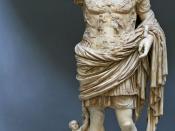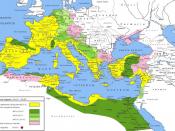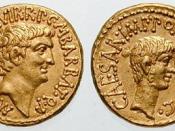By 47 BCE Caesar had won the civil war against Pompei, and soon became dictator, planning a major reconstruction of republican government. He was assassinated in 44, however, by a conspiracy of senators acting to save the Republic. Marcus Antonius then stepped forward as major claimant to power, while the Senate coalesced around Octavian, an heir listed in Caesar's will. After indecisive battles, the two put off final conflict in a second triumvirate, including Lepidus. Finally, the former two broke, and in 30 BCE, Octavian defeated Mark Antony at Actium. In the next twenty years, Octavian (now named Augustus) created the Principate, a new form of Roman government giving increased powers to a non-elective Princeps who would evolve into Emperor by the mid-first century CE.
Tiberius took over as Princeps in 14 CE, having established a solid military reputation in the Rhine area. His rule was characterized by increasingly withdrawn and autocratic power.
His successor, Caligula, went quickly insane, prompting the Praetorian Guard to murder him and proclaim Claudius Emperor in 41 CE. Less glamorous than his predecessors, Claudius did contribute to increased regularization of imperial administration, and enfranchised new elements into the roman elite, such as equestrians and some Gaulic chieftains. He in turn was succeeded by Nero in 55, who, after five good years, rapidly declined into a murderous depravity. After executing some of the Empire's best generals and senators, he committed suicide in 69, while four generals were in open revolt, and Judaea was in arms against imperial control. Germanic tribes were also acting up.
After Nero, four claimants to power emerged. Vespasianus (r. 69-79), the commander in Judaea, emerged as victor from this Year of the Four Emperors. He established the Flavian dynasty, represented by his sons Titus (80-81) and Domitian (r. 81-96). A more...


